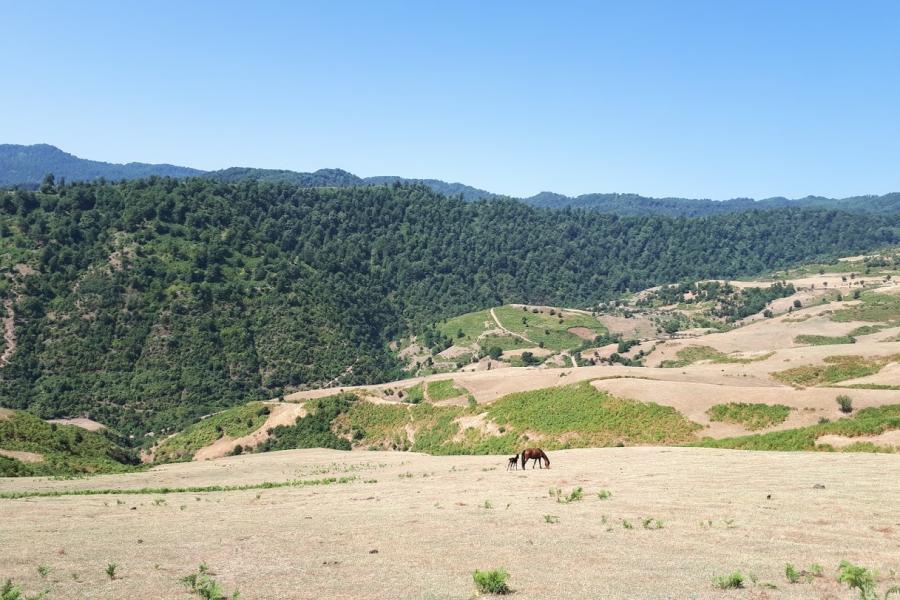Potential brewing for Azerbaijani and Georgian tea industries
20 May 2021
- Azerbaijani and Georgian teas took centre stage during an online celebration on the eve of the second International Tea Day.

The Food and Agriculture Organization of the United Nations (FAO) and the European Bank for Reconstruction and Development (EBRD) hosted the roundtable event to highlight the countries’ potential to produce high quality and specialty teas. They also shared findings from their joint tea sector reviews, including options for developing the industries sustainably.
In his opening remarks, Vladimir Rakhmanin, FAO Assistant Director-General and Regional Representative for Europe and Central Asia, pointed to the cultural significance of tea in the Caucasus and the strong legacy of tea production in Georgia and Azerbaijan.
“Tea production has a storied past in both countries, dating back over a century. Preserving this heritage and popularising the unique characteristics of these teas, both domestically and abroad, are as equally important as efforts to improve quality along the supply chain,” he said.
On hand, too, was Wojtek Boniaszczuk, EBRD Regional Head for Central and Eastern Europe, the Caucasus and Turkey, Agribusiness, who noted that “while the international competitive environment for tea is not easy, with the right investments in knowledge and technology at both the farm and processing levels, Azerbaijani and Georgian teas could become recognized symbols of quality and sustainability.”
The virtual event drew over 100 people, including representatives from government agencies, research institutions, financial institutions and private sector companies as well as Azerbaijani and Georgian tea producers.
Reviving once thriving industries
Azerbaijan and Georgia are part of the world’s northernmost tea-producing region. Both supplied a large share of tea consumed in the former Soviet Union in the 1980s, making the Soviet Union the fourth largest tea producer in the world at the time, after India, China and Sri Lanka.
But the upheaval of the post-Soviet Union era led to a dramatic decline in the two countries’ tea industries. Today, with a total combined production of around 3 000 tonnes, they account for just under 0.05 percent of global tea production.
Interest in Georgian and Azerbaijani teas is picking up, however, with the governments, farmers and the private sector taking decisive steps in recent years to revive their once thriving tea sectors.
For example, Azerbaijan approved a development programme in 2018 that would increase tea production to 3 000 hectares with an annual output of 8 500 tonnes by 2027 – more than eight times what they produced in 2018.
And in Georgia, the government adopted a programme in 2016 to rehabilitate up to 7 000 hectares of abandoned tea plantations over the coming years.
Unique characteristics
Demand for specialty tea, both domestically and internationally, is on the rise.
Azerbaijanis are already avid tea drinkers, consuming over 2 kilograms of tea per capita, ranking them alongside the United Kingdom, Turkey and Morocco as some of the top tea-drinking countries.
Azerbaijani and Georgian teas boast unique characteristics thanks to their northerly origins and specific growing conditions along the Caspian and Black Sea coasts. The teas have a bright colour, for example, and can be produced with almost zero chemicals.
This could create interesting opportunities for organic production in both countries, potentially giving their teas an edge in the export tea market, catering to consumers concerned with health and environmental considerations.
FAO Investment Centre Service Chief, Wafaa Elkhouri said that “a sustainable and forward-looking approach is key to the successful development of Azerbaijan and Georgia’s tea sectors, taking into consideration potential risks, including those posed by climate change.”
In fact, rising temperatures and more irregular precipitation patterns could introduce new pests, posing a threat to the currently limited use of pesticides and putting further pressure on the two countries’ water resources.
But as the recently published FAO-EBRD publication shows, the potential is there for producers of Georgian and Azerbaijani teas to build on the positive image their teas enjoy at home and in neighbouring countries and, with the right support, carve out a wider space in the international market.



